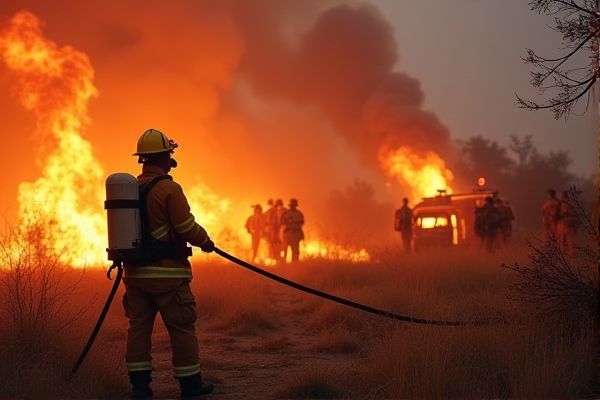
Firefighting jobs in Nigeria offer vital roles in ensuring public safety and responding to emergencies. These positions typically require candidates to undergo formal training in fire science, emergency response, and hazardous materials management. Qualifications often include certifications from relevant fire training institutions, physical fitness assessments, and sometimes prior experience in emergency services. Career opportunities exist within government agencies, private firefighting firms, and industrial sectors, contributing significantly to community safety and disaster management efforts.
Job Description
A fire fighting job in Nigeria involves responding to emergencies, including fires, hazardous materials incidents, and rescue operations. Firefighters are responsible for operating firefighting equipment, conducting fire prevention inspections, and educating the community about fire safety measures. Rigorous physical fitness and training in emergency medical services are often required to ensure readiness for various emergency situations. You will also collaborate with other emergency response teams and participate in community outreach programs to promote awareness of fire risks and safety practices.
Requirement
In Nigeria, becoming a firefighter requires meeting specific educational and physical fitness standards. A minimum of a secondary school education is often necessary, along with training from a recognized fire service institution. Candidates must also pass medical examinations and physical fitness tests to ensure they can handle the demands of the job. Strong communication skills are crucial, as teamwork and effective coordination are essential during emergency responses.
Salary and Perks Expected
The salary for a firefighting job in Nigeria varies based on location, experience, and the specific organization, typically ranging from 50,000 to 150,000 Nigerian Naira per month. Many fire services offer additional perks such as health insurance, uniforms, and training opportunities, which enhance overall job satisfaction. Career advancement can lead to higher pay and leadership roles, increasing your earning potential significantly. Job stability and the chance to serve the community also contribute to the appeal of a firefighting career in Nigeria.
Similar Job Names
- Firefighter
- Fire Officer
- Fire Chief
- Fire Safety Engineer
- Fire Inspector
- Fire Equipment Technician
- Fire Investigation Officer
- Fire Services Administrator
- Rescue Technician
- Fire Trainer/Educator
- Emergency Response Coordinator
- Hazardous Materials (HazMat) Technician
- Wildland Firefighter
- Fire Safety Consultant
- Fire Prevention Officer
- Fire Brigade Member
- Incident Commander
- Community Risk Reduction Specialist
- Fire Alarm Technician
- Volunteer Firefighter
Job Expectation Concept
Firefighting in Nigeria involves a multifaceted approach to combat the rising incidents of fire outbreaks in urban and rural areas. Firefighters are expected to possess skills in emergency response, hazard assessment, and fire prevention techniques tailored to local conditions. These professionals also require comprehensive training on firefighting equipment and safety protocols, ensuring they can effectively safeguard communities. An understanding of cultural sensitivities and community engagement enhances their efforts, fostering trust and cooperation between firefighters and the residents they serve.
Career Advantage and Weakness
Firefighting in Nigeria offers a unique career advantage through the opportunity to serve and protect communities during emergencies, enhancing public safety and saving lives. This role fosters teamwork, discipline, and leadership skills, contributing to personal growth and professional development. However, the job comes with inherent weaknesses, including exposure to hazardous conditions, physical strain, and the emotional toll of traumatic experiences. Understanding these factors can help you assess whether this demanding yet rewarding profession aligns with your career aspirations.
Important Thing Must Know
Firefighting in Nigeria involves not only combating fires but also educating the community about fire prevention and safety measures. Understanding the unique challenges faced, such as limited resources and inadequate infrastructure, is crucial for effective firefighting. Training and continuous education play a vital role, as firefighters must be skilled in various techniques and aware of the latest safety protocols. Engaging in community outreach can significantly enhance awareness and preparedness among residents. Your role as a firefighter can impact lives, highlighting the importance of dedication and teamwork in this essential profession.
Alternative Career Options
Pursuing alternative career options after a firefighting job in Nigeria can open various pathways that leverage your skills and experience. You could explore roles in emergency management, where your knowledge of crisis response applies to disaster planning and recovery efforts. Consider transitioning into safety and health administration, focusing on workplace safety regulations and accident prevention programs across industries. Another option is to engage in community education and training, helping to raise awareness about fire safety and prevention measures within local communities.
Companies List
- Nigerian National Petroleum Corporation (NNPC)
- Dangote Group
- Shell Petroleum Development Company
- ExxonMobil Nigeria
- TotalEnergies Nigeria
- Lafarge Africa
- Nigerian Railway Corporation
- Nigeria Liquefied Natural Gas (NLNG)
- Chevron Nigeria
- Eni Nigeria
- African Continental Free Trade Area (AfCFTA)
- Abuja International Airport
- Lagos State Fire Service
- Port Harcourt Refining Company
- Nigerian Ports Authority
List of Ideal City
Lagos is a bustling metropolis with a growing demand for firefighting professionals, thanks to its expanding infrastructure and populous districts. Abuja, the capital city, offers unique opportunities in municipal fire services and emergency management due to its strategic governmental establishments. Port Harcourt, known for its oil industry, requires skilled firefighters to manage industrial hazards and boiler explosions. Kano, with its historical significance and growing urban areas, also seeks dedicated individuals to enhance fire safety measures in residential and commercial sectors.
 jobs-nigeria.com
jobs-nigeria.com